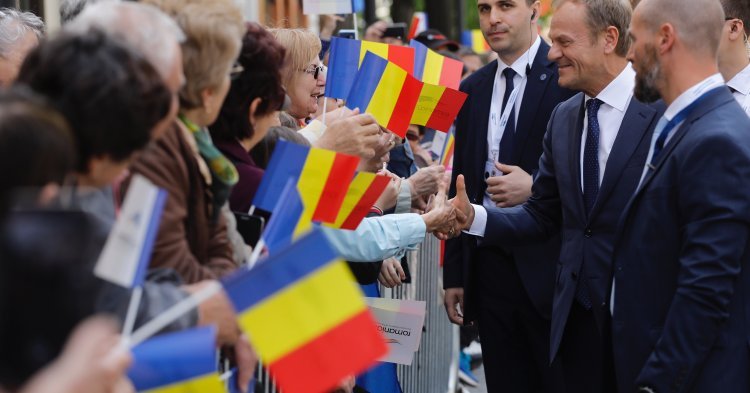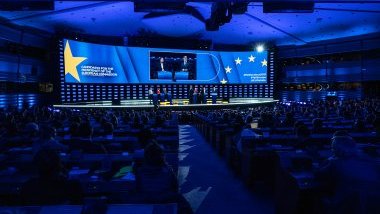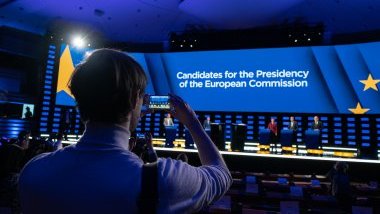The much-touted Sibiu summit, held on May 9th, was supposed to be the culmination of the collective reflection process on the Future of Europe, and relaunch the European Union ahead of the European Parliament elections on May 23rd-26th. For sure, there were powerfully evocative moments, such as when an elder woman held the German Chancellor’s Merkel face in her hands, evidently moved that the most powerful woman in Europe would travel to her city to discuss the Future of Europe. When Luxembourgish PM Bettel spontaneously initiated a chant for his French presidential counterpart – “Ma-cron! Ma-cron!” –, admittedly with disputable success, were the cheering crowds not the best demonstration that, indeed, a European public space – and a European people – are gradually shaping up?
President Juncker had staked much of his legacy on the outcome of this summit. “I wanted to show that the European Union, [...] is not only Brussels, it’s not only Bucharest, Paris or Berlin”, he said in a debate with young people the day before the summit (skip to 1:52:57). Much ado about nothing: Heads of State and Government barely managed to recommit themselves to European unity. That there would even be a need to reaffirm European unity is case in point of the utter lack of vision on the part of EU leaders.
Spitzenkandidaten and transnational lists
The Sibiu summit, however, did achieve something – although maybe a bit overlooked. President Macron, probably somewhat loose-tongued in this general climate of cheerful informality, took his clearest stance to date on the election of the President of the European Commission (henceforth, POTEC) by means of the “lead candidate” system – the Spitzenkandidaten system, in Eurobubble speak. Macron had already expressed perplexity over the system at his Sorbonne speech in 2017, were it not complemented by transnational lists.
Rectifying in part that course, in a more recent “Future of Europe” speech at the European Parliament, he had claimed to be fully supportive of the Spitzenkandidaten: that he actually believed in the system and considered it an advance in European democracy! He was quick to point out, however, that we should have gone further in the reasoning, and let the European demos emanate through transnational lists, headed by the Spitzenkandidaten of European political parties.
In Sibiu, however, asked again by German media for his stance on the issue, he gave a more brash answer: “I don’t believe it’s the right way, unless we do real European transnational lists”.
It is no secret that the European Parliament gambled, and won, in 2014. With a “velvet institutional coup”, it established the constitutional precedent of having the European Council nominating that POTEC who can command a political majority in the House. It did so by an iron pact between the relative majority forces in the House – the European People’s Party and the Socialist and Democrats – who put the power of the House before the power of their own political groupings, thus electing Juncker and advancing further in the democratisation of Europe by politicising its Government, the European Commission.
To be completely fair, Monsieur le Président is not wrong: without transnational lists, the Spitzenkandidaten are an odd system. That is, if – like many, too many politicians and pundits – one is to understand it as an approximation of a presidential system. But this is not what the Spitzenkandidaten system is. At best, it is a hybrid between a parliamentary and presidential system.
A presidential or parliamentary democracy for the EU?
The French President argues, in essence, for a process that is “intellectually clean”. A presidential system, whereby each Spitzenkandidat heads the transnational list of her/his own European political party. The most voted – by direct suffrage [1] – of these Spitzenkandidaten gets the Presidency of the Commission, and proceeds then to form her/his own “Government”, picking the Commissioners s/he sees most fit for the job. The democratic legitimacy of such a Government would stem from the direct election of its President.
The alternative to this system is a fully parliamentary democracy, whereby the Spitzenkandidaten are unnecessary: the Head of the European Government would be decided through negotiations by political groups in the European Parliament, without a direct vote of the citizens. It may happen that one or the other party leader gets the job, or it may not. Like in many healthy parliamentary democracies across Europe, no one doubts the democratic legitimacy of a Government leader elected in such a manner. After all, Chancellor Merkel leads her Government, despite her not having been elected by all Germans – and yes, she was the Spitzenkandidat of her own party, the CDU.
The oddity with the Spitzenkandidaten system is that is neither and both at the same time. The misunderstanding of President Macron, and of many who agree with him, is that the European political party that comes first in the elections necessarily gets the Commission’s helm. That is blatantly untrue: the party coming out on top on election night merely gets the first chance at forming a Government. Even President Juncker, arguably the most socialist of the Christian democrats, had to negotiate a political agreement between the EPP and the S&D to ensure a majority for his election.
The Spitzenkandidaten under attack – again
In 2014, the priority was to ensure that the European Parliament prevailed over the European Council. In 2019, were the Spitzenkandidaten not under constant attack, there would certainly have been a wider margin for alternative coalition building in the House. It might well have been that the Grand Coalition of EPP and S&D would finally have come to an end, leading to further parliamentarisation of European politics. A majority vs. opposition dynamic could have, by presenting clear alternative views on the future of Europe and actively engaging with the electorate about these views, rekindled the relationship between European citizens and their elected representatives, finally arresting a consistently decreasing turnout in the European elections.
Enter Macron’s colleagues, and in particular President Tusk, the agenda-setter of them all. It should come as no surprise that many of them are still sour about the Parliament’s successful move in 2014. They are now trying to get back the upper hand, and regain the power to nominate the next POTEC, which they effectively lost in the previous round of European elections. Thus, in Sibiu, they committed to swiftly deciding – on a special summit to take place on May 28th – on the “EU top jobs”, the nickname for the leadership positions to be reassigned after the elections.
This time around, these include POTEC, the High Representative for Foreign Policy, the President of the European Council, and the President of the European Parliament [2]. The problem is, among all the criteria that would guide such a process (geographical and gender balance, among others), the political result of the European elections ranked pretty low.
For a Spitzenkandidaten renewal
Is the Spitzenkandidaten process “intellectually clean”? Certainly not. The processes for their election widely differ across political parties. New formations, such as Macron’s La République en Marche/Renaissance, are essentially prevented from having a say in the process if they do not join an established political party. While European political parties have a common platform and a common candidate for the elections, the campaigns still differ widely across Member States, as they maintain a scent of midterm election (thanks also, in part, to the poor job that European media does at reporting the elections as “European”).
But politics is not clean, Mr Macron! The Spitzenkandidaten are but a means to an end. They are a means to increase the visibility of European elections: arguably a successful one, considering that even the Eurosceptic Conservative and Reformist party (ACRE) fielded their own candidate, after vehemently opposing the process in the previous election round. They are also a means to establish the primacy of the European Parliament and of European political parties, over intergovernmental horse-trading in the European Council.
Much like the transnational lists cherished by President Macron and most federalists, like myself, also are an imperfect means. Some of the criticism of transnational lists coming from the EPP – its main opposer – was at least intellectually sound, despite being politically opportunistic. Here again, though, the transnational lists were an institutional innovation primarily designed to let the European demos arise. There is a feeling of Europeanness in citizens, as well as awareness of the European dimension of matters such as migration, climate change, and social inequalities. Yet there is no means for citizens to express either on a ballot. This was the purpose of transnational lists – no matter the fact that “they don’t exist in any other federal system”.
The Spitzenkandidaten may be an imperfect political trick attempting to achieve a less incomplete European democracy. But they establish that the citizens choose – through their indirect vote for a European political party – who will lead the European Commission. The citizens, not Governments through horse-trading and petty bargaining.
The moment has come to pick a side and leave behind short-sighted party interests. The moment not just to celebrate the EU’s achievements so far: but to choose Europe, wholeheartedly and without reservations. President Macron, undoubtedly one of the few EU leaders with a clear, positive, forward-looking vision for the future of Europe, must decide. Will he stand with his colleagues and stick to the intergovernmental swamps of the status quo? Or will he stand – as I hope – with European citizens, who crave for a social, sovereign and democratic Europe – in essence, a federal Europe?





Follow the comments: |
|
